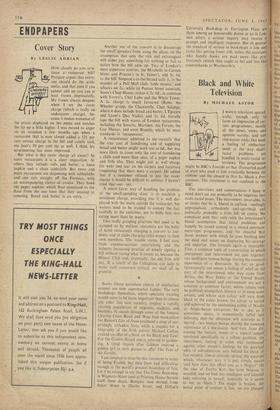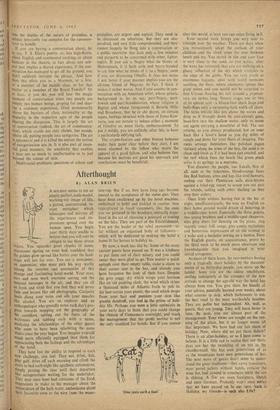Black and White Television
By MI( HAI L AST OR
I WATCH television sporad- ically, enough only to form an impression of cer- tain programmes, mostlY of the news, views and opinion variety; and one impression sticks like mud, a feeling of embarrass- ment at the way multi- racial disc
problems are
handled in multi-racial in- terviews. The programme might be BBC's Tonight or that ill-assorted panel of stars who used to jink erratically between the sublime and the absurd in No! So Much a Pro- gramme. The treatment is not confined to the BBC.
The interviews and conversations I have in mind don't set out primarily to be inquiries into multi-racial issues. The interviewer, invariably, is, or thinks that he is, liberal in, outlook—smilingly unprejudiced, , orthodoxly anti-apartheid and politically probably a little left of centre. No complaint with this; only with the interviewer's bland assumption that racial problems can happily be tossed around in a mixed entertain- ment-type programme; and the cheerful Boy Scout manner with which he goes hurtling into the deep end intent on displaying his courage and expertise. The formula again is invariable. First, a common topic of conversation in which interviewer and interviewed are pals together, two intelligent human beings sharing the common experience of a discussion. So far, so good. Occasionally one senses a feeling of relief on the part of the interviewed, who may come from Africa. the West Indies or the United States, whose background and environment are not a constant or common factor, whose talents may be political, evangelical, literary or in some sense artistic, and whose skin colour will vary from black to the palest brown, the colour so envied and achieved by the sunbathing public of Nordic or Anglo-Saxon extraction.- He or she, so it sometimes seems, is momentarily lulled into believing that the interview. will continue as it started: two human beings sharing the common experience of a discussion. And then, from dis- cussing the theatre, music or a topical subject unrelated specifically to a colour problem, the , interviewer, feeling in some way immunised against other people's feelings by his personal aura of self-adulation, safe behind his cloak of fair-minded, liberal attitude, springs the question which, whichever way it is put, simply means `and how does this affect you as a Negro?' (In the case of Eartha Kitt, the term Negress is avoided, and we find that intelligent and talented lady referring to herself, ironically so it seems to me, as `black.') The magic is broken, the initial point of contact is lost, we are plunged • gre the wa an. Wt eh ntt ap of
into the depths of the nature of prejudice, a subject invariably too complex for the commen- tator to handle.
if you are having a conversation about, let 4s say, T. S. Eliot's poetry, or, less high-flown, about English and continental cooking, or about humour in the theatre, in fact about any sub- ject that implies a shared experience, if the con- versation has managed to get off the ground, you don't suddenly interject the phrase. 'And how does this affect you as a Mormon. or a Jew, or a member of the middle class. or for that Matter as a member of the Royal Family?' Or at least, if you do, you will lose the magic moment of conversation when two people are simply two human beings, groping for and shar- ing a common experience, lifted momentarily above the barriers of class, nationality or the disparity in the respective ages of the people sharing the discussion. This is largely the art of, conversation (indeed, the art of communica- tIon), which avoids not only cliches, but avoids, above all, putting people into categories. The art is ephemeral and it is killed the instant the notion of categorisation sets in. It is also part of essen- tial good manners, the sensitivity that enables a man not so much to intellectualise as to fed beyond the colour of skin.
Multi-racial problems, questions of colour and prejudice, arc urgent and topical. They need to be discussed on television. But they are also involved, and very little comprehended, and they cannot happily be flung into a conversation or a public interview that lasts only a few minutes and purports to be concerned with other, lighter topics. If you ask a Negro what he thinks of Shakespeare, it is both arch and heavy-handed to ask him what he thinks of it 'as a Negro,' even if you are discussing Othello. It does not make it any better if your manner implies you are the all-time friend of Negroes. In fact. I think it makes it rather worse. And if you assume in con- versation with an American artist, whose genetic background is, let us say, part-Negro, part- Jewish and part-Scandinavian, whose religion is Baptist and whose foreground is Beverly Hills and Broadway, that he or she shares, on certain issues, feelings identical with those of Jomo Ken- yatta, you are certain to induce either a moment of frivolity or, more likely, embarrassment. To put it mildly, you are unlikely, after this, to have a particularly edifying talk.
The crypto-fascists and other human baboons make their point clear before they start. I am more alarmed by the fellow who wears the apparel of a good fellow, and who believes that because his motives are good his approach and conclusions /mist be beneficial.



































 Previous page
Previous page